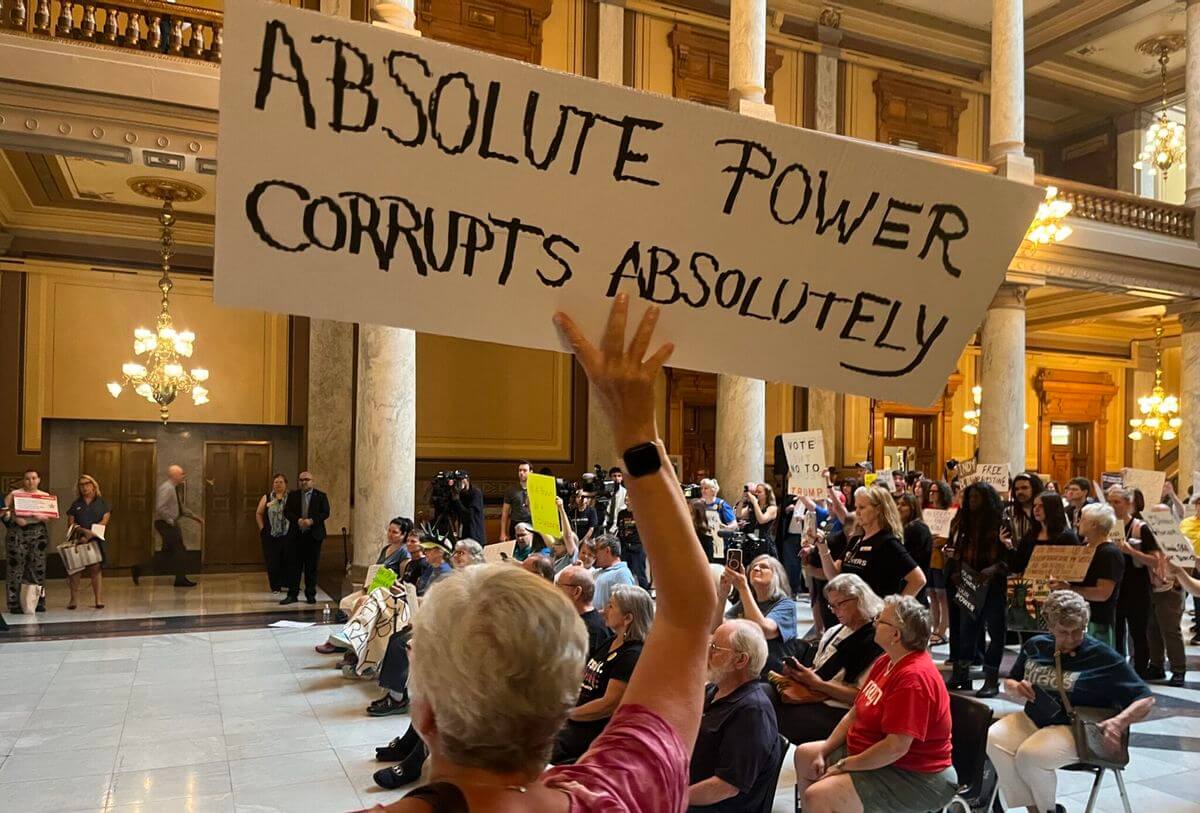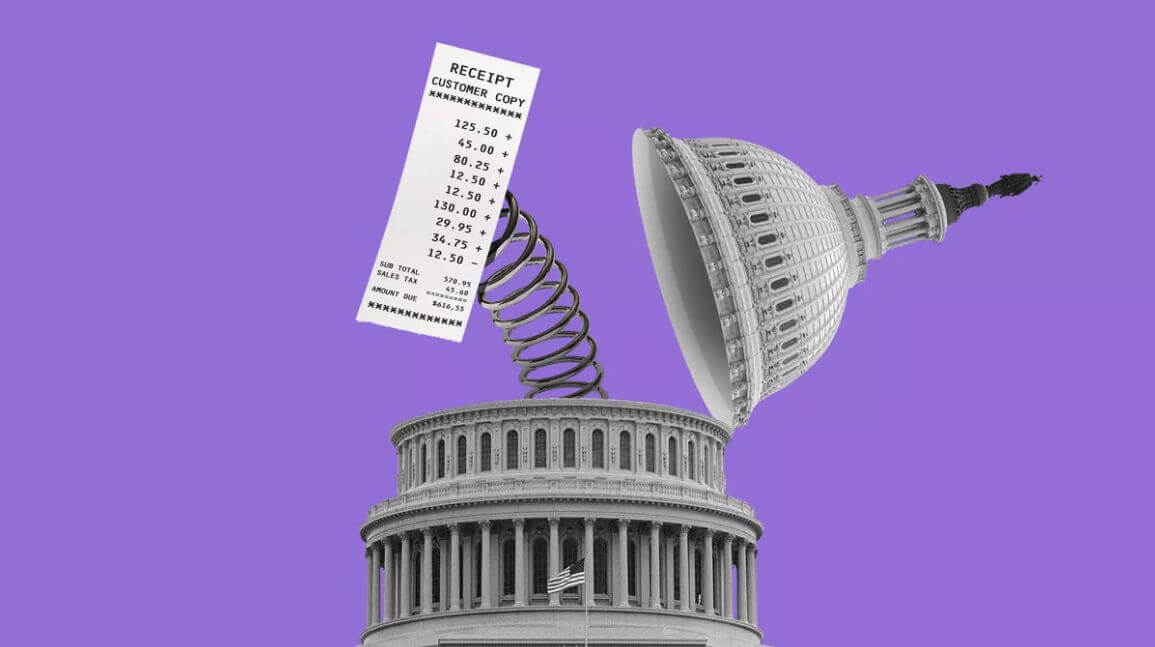8/12 Torchbearer Weekly Policy Update
Thank you for letting us be your trusted source for local, state, and federal policy updates.
And a special thank you to Ben Auslander who has been drafting and editing this newsletter for the past few months. He’s headed to the University of Florida this week and we are so grateful for all of his hard work. Good luck Ben (and good luck to Mom as she sends her first-born out into the real world!)
Let’s dig in…
- VP Vance Meets with Indiana GOP Leadership on Redistricting; Democrats Denounce Effort
- A Top Federal Reserve Official Says Dour Jobs Data Backs Case for 3 Rate Cuts
- State Revenues Beat Projects in July
- Indiana Agencies Outline Spending Cuts in Pursuit of 5% Reserve
- States Scramble to Complete Renewable Energy Projects Before Tax Credits Expire
- EU’s New AI Code of Practice Could Set Regulatory Standard for American Companies
- The trade war is just starting
- State agency revises Medicaid budgeting
- Young, Klobuchar boost small biz support
- Indiana tops U.S. road quality
- Senate approves $180B funding pre-recess
- Share the Torchbearer Newsletter with Your Network!
- Important Dates
VP Vance Meets with Indiana GOP Leadership on Redistricting; Democrats Denounce Effort

Vice President JD Vance visited Indiana to advocate for new redistricting, but state leaders remain hesitant.
Why it matters: Redistricting could reshape political influence in Indiana, impacting representation and policy priorities.
- Republican leaders, including Gov. Mike Braun, are cautious about making changes without broader consensus.
The big picture: The push comes amid national GOP efforts to secure more seats in Congress.
- Indiana's current map favors Republicans, with a 7-2 advantage, but changes could alter the balance.
What's next: Gov. Braun must decide whether to call a special session to address this issue.
- The decision involves weighing the political and financial costs of redrawing the state's districts.
What they're saying: Opponents argue that the move is a political power grab.
- "Redistricting isn't just politics — it's about ensuring the voice of We the People is heard," said Lt. Gov. Micah Beckwith. (Indiana Capital Chronicle)
A Top Federal Reserve Official Says Dour Jobs Data Backs Case for 3 Rate Cuts

Federal Reserve official Michelle Bowman argues for lower interest rates following a disappointing U.S. job market report.
Why it matters: Lowering interest rates could stimulate economic growth by making borrowing cheaper, but it risks increasing inflation.
- Bowman's stance is bolstered by recent labor data showing weaker hiring than expected.
The big picture: Nine other Fed officials voted to maintain current rates, prioritizing inflation stability in light of Trump's tariffs.
- Fed Chair Jerome Powell is cautious, awaiting more data on the tariffs' inflation impact before adjusting rates.
What's next: With three meetings left in 2025, the Fed faces pressure to cut rates, especially as Wall Street anticipates a reduction in September.
- President Trump's push for rate cuts adds political pressure, alongside his opportunity to appoint a new Fed governor. (IBJ)
State Revenues Beat Projects in July

Indiana's General Fund revenues in July totaled $1.6 billion, surpassing the April 2025 forecast by $17.8 million or 1.1%.
Why it matters: This revenue boost highlights Indiana's economic resilience and potential for budget flexibility amidst varying tax collection trends.
- Sales tax and interest revenues outperformed expectations, offsetting declines in individual and corporate income tax collections.
By the numbers: July's revenue was $82.2 million higher than the same month in 2024, indicating strong fiscal growth year-over-year.
- Riverboat wagering collections exceeded estimates, while cigarette tax collections fell short.
You can read the full July 2025 revenue report here. (Inside Indiana Business)
Indiana Agencies Outline Spending Cuts in Pursuit of 5% Reserve

Indiana state agencies are implementing strategic plans to manage effective 10% budget cuts due to a tough fiscal cycle.
Why it matters: The cuts, prompted by a grim revenue forecast, challenge agencies to innovate and streamline operations while maintaining essential services.
Details: Agencies are cutting contracts and reallocating resources to save millions.
- The Indiana Department of Administration (IDOA) eliminated consulting and software contracts to save upwards of $2 million, emphasizing the need for a comprehensive review of new expenses.
What's next: Agencies are exploring legislative measures to facilitate further cost-saving strategies.
- Forensic medical exam reimbursement caps, as proposed by the Indiana Criminal Justice Institute, could potentially save up to $2 million by establishing a sustainable reimbursement framework.
- The Indiana Election Division seeks exemptions from budget cuts due to rising election costs, highlighting ongoing financial challenges in the face of increasing cyber and physical security threats.
- Some agencies, like the Indiana Destination Development Corporation, are facing significant budget reductions, leading to layoffs and a reevaluation of funding sources. (IBJ)
States Scramble to Complete Renewable Energy Projects Before Tax Credits Expire

The abrupt termination of tax credits for clean energy projects is a significant move by President Trump, underscoring his stance against wind and solar energy.
Why it matters: The end of tax credits threatens ongoing and future renewable projects, potentially raising electricity costs as states rush to meet deadlines.
- States like Washington are expediting permitting processes to keep projects on track.
The big picture: The loss of credits challenges states aiming for renewable energy reliance, with potential rate hikes affecting residents.
- Industry leaders warn of project cancellations and increased reliance on fossil fuels, impacting economic and environmental goals.
What’s next: States with renewable mandates remain committed, but face financial and operational hurdles.
- Economic incentives will likely shift focus towards Democratic states with robust renewable policies, altering national investment landscapes. (Indiana Capital Chronicle)
EU’s New AI Code of Practice Could Set Regulatory Standard for American Companies

American companies are divided on the EU's voluntary General Purpose AI Code of Practice, which aims to align tech firms with the upcoming EU AI Act.
Why it matters: Compliance is crucial for companies wanting to operate in Europe, impacting transparency, safety, and copyright standards.
- Major players like Amazon, Google, and Microsoft have signed on, but Meta has refused, citing legal uncertainties.
The big picture: The EU's AI Act mandates transparency and risk management, posing challenges for U.S. companies accustomed to fewer regulations.
- Differences in regulatory approaches highlight a divide between U.S. and European perspectives on AI development.
What's next: As the 2027 compliance deadline approaches, companies must decide whether to adapt to the EU's standards or face potential operational barriers.
- The code's voluntary nature now offers a chance for early compliance, reducing future administrative burdens. (Indiana Capital Chronicle)
The trade war is just starting

As of Thursday, new global tariffs are in effect, marking the beginning of an ongoing trade war.
The big picture: Anyone expecting President Trump's tariff deadline to be the last word on trade will be surprised.
- Unlike past negotiations, trade is now an ongoing process where the U.S. can impose tariffs on any country at any time.
Consider the news: Recently, Trump imposed and then doubled tariffs on India over Russian oil purchases, while leaving China, a similar buyer, unaffected.
- A 100% tariff on semiconductors was announced without a completed investigation, but exemptions were promised for U.S.-based companies, creating loopholes for major chipmakers.
Reality check: CEO sentiment improved as tariffs and trade concerns eased.
- The stock market continues to rise, driven by relief over chip tariff exemptions, and volatility across asset classes has decreased.
What to watch: More tariffs are expected soon, including on lumber and pharmaceuticals.
- Sanctions on Russia could lead to higher tariffs for multiple countries.
- The trade truce with China ends on August 12, and while China is open to extending, Trump has yet to act.
The bottom line: We're only at the beginning of this trade conflict. (Axios)
State agency revises Medicaid budgeting

Indiana's Family and Social Services Administration (FSSA) plans a strategic budget overhaul to manage escalating Medicaid costs.
The big picture: Indiana anticipates a significant rise in per-enrollee Medicaid costs over the next decade, with increases of 43% for lower-income and 72% for elderly Hoosiers.
- Expenses for the Healthy Indiana Plan could grow from $2.9 billion in 2017 to $7.5 billion in 2027.
- For elderly Hoosiers, costs may increase from $4.2 billion to $11.3 billion.
What they're saying: FSSA Secretary Mitch Roob highlights a shift in budgeting, focusing on reducing the state's contribution to Medicaid from 16% to 2%.
- "We’re going to solve for 2% … because that’s all we can afford," Roob emphasized.
What's next: Potential changes include ending Medicaid advertising, reducing administrative contracts, and cutting other expenses.
- The agency will face challenges like rising Applied Behavior Analysis therapy costs and attendant care services.
Child care impact: The state will not issue new child care vouchers in 2025, impacting low-income parents reliant on the program.
- Child care enrollment fell from 70,000 in 2024 to roughly 55,000.
Federal influences: Indiana will pay $50 million more for SNAP due to administrative costs but seeks $200 million from a federal hospital fund for Medicaid.
- The state's waiver application for HIP reform is still under federal review.
Bottom line: Indiana's FSSA is taking aggressive steps to control Medicaid costs amid complex financial challenges. (Indiana Capital Chronicle)
Young, Klobuchar boost small biz support

U.S. Senators Todd Young (R-Ind.) and Amy Klobuchar (D-Minn.) have introduced two bills to strengthen American small businesses by enhancing the Small Business Administration's (SBA) 504 loan program.
The big picture: The 504 Credit Risk Management Improvement Act of 2025, led by Young, aims to increase oversight and efficiency in the 504 loan program, enhancing accountability.
- The 504 Modernization and Small Manufacturer Enhancement Act, spearheaded by Klobuchar, seeks to update the loan guarantee program and improve access to affordable capital for small manufacturers.
Why it matters: Small businesses are crucial to the U.S. economy, creating about two-thirds of new jobs and generating nearly half of all economic activity.
- These bills aim to ensure more small businesses, including small manufacturers, can access necessary resources to thrive.
What they’re saying: "Our bills will strengthen the SBA’s 504 loan program, which provides access to affordable capital," said Senator Young.
- "By making key improvements, our bipartisan legislation will ensure that more small businesses can benefit from this loan program," added Senator Klobuchar.
What's next: After their introduction in 2023, both bills passed the Senate Committee on Small Business and Entrepreneurship, moving closer to implementation. (Office of Senator Todd Young)
Indiana tops U.S. road quality

Despite common perceptions of potholes and construction, Indiana ranks No. 1 in road quality according to U.S. News & World Report.
The big picture: The ranking is based on the percentage of road miles in poor condition, with Indiana having the lowest percentage nationwide.
- This may surprise many Hoosiers, but data from the Federal Highway Administration supports this finding.
How others rank: Following Indiana, South Dakota, Kansas, Wyoming, Vermont, and Nebraska round out the top states for road quality.
Overall ranking: Although Indiana led in road quality, its overall state ranking is 33rd when factors like education, health care, and economy are considered.
- U.S. News uses eight categories to determine the best states, with Indiana scoring lower in areas like natural environment and fiscal stability.
What to know: The top overall states include Utah, New Hampshire, and Idaho, with diverse strengths across the board. (Indy Star)
Senate approves $180B funding pre-recess

The Senate passed over $180 billion in funding for fiscal year 2026, covering departments like Veterans Affairs and Agriculture, before the August recess.
The big picture: This funding includes $153 billion for the VA and military construction, and $27 billion for agriculture, including programs like WIC and FDA.
- The legislative branch receives $7 billion for operations, with Capitol Police and CBO seeing increased funds.
Why it matters: This marks the first time since 2018 that the Senate has passed funding bills before the August break, setting a precedent for future legislative sessions.
- However, a potential government shutdown looms as Congress must negotiate a deal to keep the government funded beyond the September 30th deadline.
What they’re saying: "A lot of people just [forgot] the procedures," said Sen. John Boozman, highlighting the significance of this legislative milestone.
- "We're going to have to make do with $250 million less," noted FSSA Secretary Mitch Roob, addressing budget constraints in Indiana.
What's next: The Senate faces a challenging September to finalize a funding stopgap (CR) and address unresolved issues like the FBI headquarters relocation.
- The focus will be on achieving a continuing resolution to prevent a shutdown. (The Hill)
Share the Torchbearer Newsletter with Your Network!

Not signed up for our weekly newsletter? Sign up today!
Important Dates:

Artificial Intelligence Task Force: Thursday, August 14th at 1:00 pm
Interim Study Committee on Courts and the Judiciary: Monday, August 18 at 1:00 pm
Government Reform Task Force: Tuesday, August 19 at 1:00 pm
Artificial Intelligence Task Force: Thursday, August 28th at 2:00 pm
Artificial Intelligence Task Force: Monday, September 8th at 1:00 pm
Interim Study Committee on Agriculture and Natural Resources: Thursday, September 11th at 1:00 pm
Interim Study Committee on Energy, Utilities, and Telecommunications: Wednesday, September 24th at 1:30 pm
